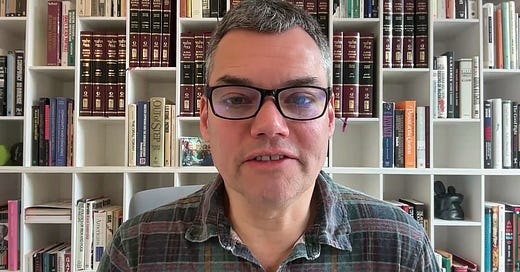For the foreseeable future, our Zoom calls will be held at a new time: Friday at 11 AM Eastern.
Our guest this week will be Congressman Ro Khanna, who represents the 17th district of California and is a leading progressive voice in Democratic foreign policy. He has called on Israel to immediately halt its attack on Rafah and also tried to convince protesters against the war to support Joe Biden’s reelection. We’ll talk about US policy toward the war, whether Biden can win back progressives who feel betrayed by it, and about the relationship between progressivism and Zionism more generally.
Paid subscribers will get the link this Tuesday and the video the following week. They’ll also gain access to our library of past Zoom interviews with guests like Rashid Khalidi, Thomas Friedman, Ilhan Omar, Benny Morris, Noam Chomsky, and Bret Stephens.
Sources Cited in this Video
Things to Read
(Maybe this should be obvious, but I link to articles and videos I find provocative and significant, not necessarily ones I entirely agree with.)
The Jewish Currents (subscribe!) podcast discusses the end of Curb Your Enthusiasm.
Like so many people with family in Gaza, the political analyst Khalil Sayegh has endured unthinkable agony since this war began. He’s seen his father and sister killed. He’s trying to bring his remaining family members to safety. If you can help, please do. Please also consider helping the Alshawa family, which is sheltering in central Gaza and hoping to evacuate to safety.
For the Foundation for Middle East Peace’s Occupied Thoughts podcast, I talked to Shraddha Joshi and Asmer Safi, Harvard students whose degrees are being withheld because of their activism for Palestinian rights.
An open letter from academics in Gaza.
The descendants of Nazis march for Israel.
Viewer Response:
After my last video, David Lelyveld questioned my suggestion that the war would dog Anthony Blinken and Jake Sullivan after they leave government. He wrote, “McGeorge Bundy went from the Johnson administration to the presidency of the Ford Foundation for some 15 years. Walt Rostow had a comfortable, well-endowed chair at the University of Texas for 30. As we say in New York, not chopped liver. I wouldn't weep for Biden's subordinates.”
See you on Friday at 11 AM,
Peter
VIDEO TRANSCRIPT:
America’s relationship with Israel is a little bit like imagine there’s a person in a house, two groups of people in a house, but one is vastly more powerful. And they’re fighting with one another. And the vastly more powerful side, as you might imagine, is doing a tremendous amount of violence to the weaker side. The weaker side is doing some violence as well, but it’s very disproportionate. And this being Israel and the Palestinians. And the United States is giving weapons to the side that’s stronger and allowing it to kind of pummel the weaker side more and more. And the United States is continuing to do that, and then kind of making suggestions from the side.
So, a while back, Chuck Schumer said that it would be good if Benjamin Netanyahu were not Israel’s prime minister anymore. So, it’s kind of the equivalent of saying to that stronger side in the house, you know, we think that you should have someone else from your group actually be in charge of this conflict. Or now, we have Joe Biden basically laying out this plan for a ceasefire over multiple stages, again basically giving his advice to both sides about how maybe this conflict could end, but all the while continuing to give the weapons that continue to fuel the conflict and allow the stronger side to continue to inflict all this violence on the weaker side.
And it’s just really bizarre. Because America’s primary responsibility is not actually to choose Israel’s leaders. And America’s primary responsibility is not even actually to end this war. America’s primary responsibility is to figure out what it does with its money and its weapons. That’s what America has direct control over. America doesn’t have actual direct control over how this war in Gaza ends. From a moral perspective, its primary responsibility is its own role. And there’s this weird way in which, in establishment American discourse, we essentially ignore our own role in this and suggest that we are some kind of neutral arbiter, and then throw out various proposals for how the situation may be solved as if we are not an active participant in it, right? And then we seem disappointed when Israel, or sometimes the Palestinians, basically reject these proposals—but often Israel—because they know that we’re not a neutral observer, that we are a participant, but we are on their side, and that that participation will continue irrespective of what they say about our proposal. So, there’s not very much cost for them in rejecting the proposal.
It seems to me this is exactly the wrong way to think about it. It’s a cliché. But it’s true that in the long run, ultimately, this war and this conflict in this situation will have to be solved by Israelis and Palestinians, not by America. So, America’s fundamental moral responsibility is not to solve to end the Israeli-Palestinian conflicts, not even to end the Gaza war. It’s to act ethically with the power that we have. And the power that we have is our power to give weapons and other forms of diplomatic support to one side that continues this.
So, what Joe Biden should be saying is not, ‘here’s our 11-point plan for ending the war.’ It should be, simply: ‘it’s not ethical for the United States to continue to arm and diplomatically protect Israel as it inflicts this horrible violence against Palestinians. I’m the American president. I’m in charge of how we spend our money and who we send our weapons to, and I’m not going to do that.’ Now that might have—or could have—a real impact on Israeli politics, on whether Netanyahu stays prime minister, on how Israel prosecutes this war, or even whether it does. We don’t know what the consequences of that would be.
But in some ways, the consequences are not America’s primary responsibility. America’s primary responsibility is our involvement in the conflict. And yet so often it’s that question, which essentially recedes. And because the Biden administration doesn’t want to have to deal with that central question, with the political fallout of actually addressing America’s role, it tries to sidestep that by suggesting America continue to be this active participant, but also be this supposedly neutral umpire that can basically come out with a way of solving the conflict. And that doesn’t work. It’s not America’s fundamental job.
The president’s job is to be able to say to the American people: ‘I am ethically and wisely using your money in the way we interact with other countries.’ That’s the question that Joe Biden should have addressed when he spoke to the nation a few days ago. Instead, he continues to evade that question and ends up in these kinds of cul-de-sacs that make him look weak, make him look impotent, and ultimately don’t respond to his fundamental moral responsibility as the president of the United States.










